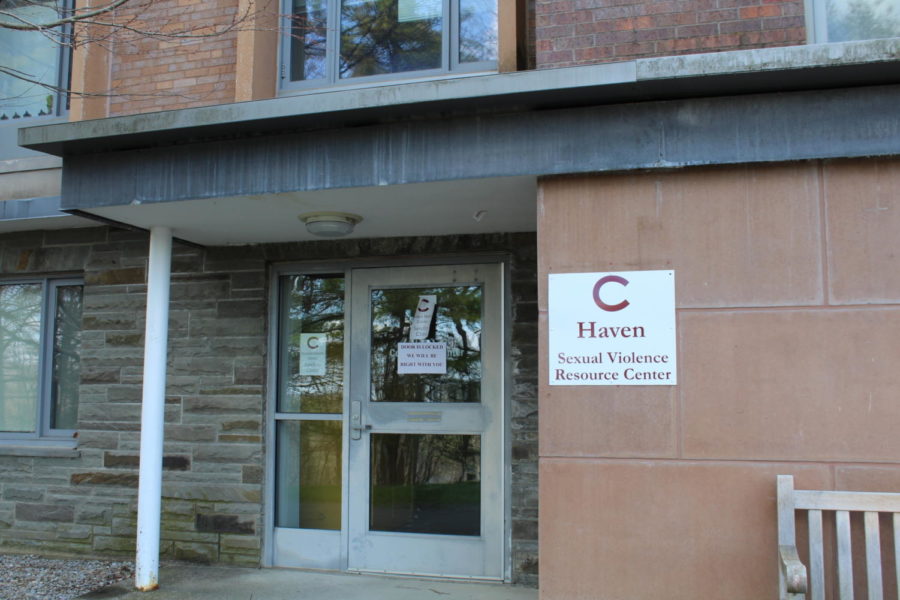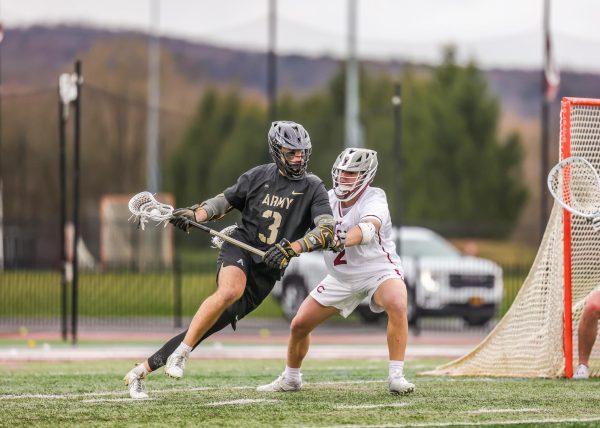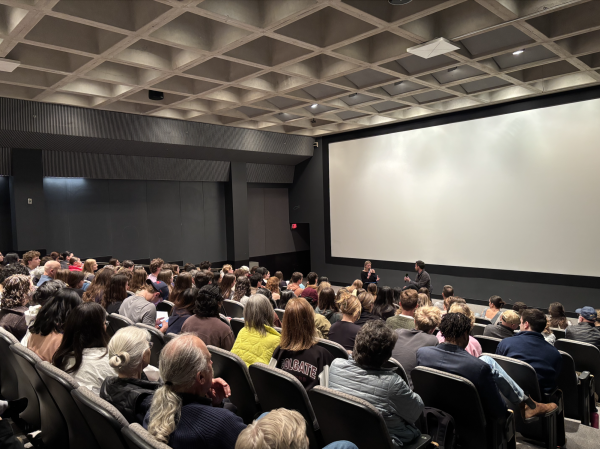Administrators Discuss University Response to Sexual Assault in SAAM Panel
As part of their schedule of events for Sexual Assault Awareness Month (SAAM), Haven, Colgate’s center for sexual violence survivor support, hosted a virtual panel on April 13 to discuss both the University’s response to accounts of sexual violence on campus and options available for survivor support.
Panelists included Vice President and Dean of the College Paul McLoughlin, Associate Provost for Equity and Diversity and Title IX Coordinator Lyn Rugg, Director of Counseling and Psychological Services and Director of Sexual Violence Support Dawn LaFrance and Help Restore Hope Advocate Julianne Thomas.
Haven intern and junior Mackenzie Harrison organized and moderated the panel. Harrison said she noticed a disparity between students’ and administrators’ opinions on the University’s response to accounts of sexual violence, particularly amid campus discourse on the issue this semester, prompting her to reach out to McLoughlin to organize the event.
“I really saw the need this semester to have there be some more dialogue between staff and administration and the student body. I feel like with a lot of the student conversations that I’ve been in this semester, students don’t really understand the rules that administrators are stuck working with responding to sexual violence,” Harrison said.
McLoughlin echoed this sentiment, adding that he feels student trust in the administration is crucial to addressing campus sexual violence.
“The very first step a survivor needs to take is to trust the administration, that we’re here to help them. I hope that [the] panel is an illustration not only of the plethora of resources that we have available, but that there is a genuine interest on the part of the administration,” McLoughlin said during the event. “It is a confusing process, which is why we all want to be here tonight, to talk through that process, but at the very core of what is a necessary foundation, is the ability for a survivor to trust us.”
Recent testimonials of sexual assault published on the Instagram account @shareyourstorycolgate have amplified a sentiment of distrust in administration and in their response to instances of sexual assault.
Senior Madeleine Kardek echoed this wariness to trust members of the administration.
“The importance of trust was brought up in the meeting — trust in the process, in our administration. I believe trust has to also be garnered amongst the student body and, in my perspective, trust needs to be earned,” Kardek said. “Students undergo bystander intervention as incoming students but it feels as though the education on sexual and relationship violence ends there.”
Harrison began the conversation by asking the panelists what resources are available to students immediately following an incident of sexual violence. In response, LaFrance explained that at Haven, trauma-informed counselors are available during business hours to provide support. Outside of business hours, students can speak with an on-call counselor or dean within the University.
Additional student resources include a a sexual assault nurse examiner (SANE) at Community Memorial Hospital available 24/7, as well as the Hamilton Police Department. If students would rather work with an off-campus advocate, the Help Restore Hope hotline provides 24-hour support.
Junior Abby Douglas, a member of the Medusa Movement’s public relations committee, feels that Colgate’s support resources should be more accessible.
“I think that there should be more accessibility. There’s not someone on-staff at the counseling center or Haven 24/7, there’s technically a 24/7 hotline, but I think there needs to be someone on staff, whether at the counseling center or at Haven, all the time. Most of the times that sexual assaults are happening are at nighttime, when there’s no one at Haven.”
Harrison directed her next question toward Rugg, asking what actions a survivor should take if they want Colgate to take official action to hold someone accountable in a case of sexual violence.
“A student who alleges sexual violence or any form of sexual assault must reach out to a Colgate University policy administrator and submit a written, signed complaint in order to initiate the investigation and adjudication process,” Rugg said. “Our sexual misconduct procedures identify the following individuals as policy administrators who are trained to receive and respond to reports: me, as the Title IX coordinator; Tamala Flack, who is the University’s Executive Director for Equity and Inclusion; Dean Dorsey Spencer, who is the Dean of Students; Dean Kim Taylor, who is the Dean for Administrative Advising and Student Conduct; and any [Prohibited Conduct Response Group (PCRG) members].”
PCRG members are an “informal source of advice and referral for those who seek a solution to problems of discrimination, harassment or sexual assault, or who wish to discuss their concern before deciding whether to file a formal complaint,” according to the University website.
Harrison further questioned Rugg on the temporary protections offered immediately for survivors following a Title IX complaint, which include no contact orders and counseling and support services through Haven and the Counseling Center.
“Supportive measures are intended to restore or preserve, to the extent practicable, equal access to the University’s educational programs and activities, which is the goal of Title IX. To protect the safety of all parties without unreasonably burdening any party, supportive measures can include, but are not limited to, changes or adjustments in academics, such as the extension of deadlines or other course related adjustments, or allowing withdrawal from a course without penalty,” Rugg said. “It can also bring changes to housing, transportation and campus working situations, if those changes are requested by a party and reasonably available.”
Rugg added that under the federal government’s Title IX regulations, measures taken by the University are meant to be supportive, not disciplinary.
“Supportive measures must be just that, supportive,” Rugg said. “They cannot be disciplinary; they cannot be punitive in nature. They cannot place an unreasonable burden on one party prior to a finding of responsibility after the adjudication. In each case, we are required to weigh the benefits of the supportive measure to one party against the burden on the other party.”
Elaborating on the actions the University can take following a Title IX complaint, Rugg explained that a mandated emergency removal regulation, formerly called interim suspension, restricts the University’s ability to remove a perpetrator of sexual violence from campus.
“Emergency Removal can only occur after the University has undertaken a full-scale, individualized safety and risk analysis, and if the individualized safety and risk analysis determines the immediate threat to the physical health or safety of any student, only then can a student be removed until the investigation and adjudication are complete,” Rugg said. “They’ve made it extraordinarily difficult to interim suspend a student for a Title IX case.”
Not all students agree with the process behind removing a student from campus for sexual assault related offenses, especially when compared to the school’s ability to suspend students for violating the Commitment to Community Health.
“In my eyes, if you can send someone home for [coronavirus]-related offenses, you can send someone home for sexual assault-related offenses,” Douglas said.
Rugg clarified that this process could change in the future, citing U.S. President Joe Biden’s request that the Office of Civil Rights in the Department of Education undertake a reexamination of Title IX policy and procedure.
Douglas expressed frustration with the state of Title IX under the Trump Administration and said she’s hopeful the new administration will reform the current process.
“I’m hopeful that with the Biden administration, some of these Title IX regulations will go back to the way they were before [Former United States Secretary of Education] Betsy DeVos,” Douglas said.
During last week’s event, panelists also discussed how students can continue to receive support from both on and off campus resources after filing a Title IX complaint.
“I think of Haven and the Counseling Center staff as advocates in the process from the counseling perspective, so we don’t help students directly go through the process, but we can help students while they’re in the process,” LaFrance said. “As far as Help Restore Hope, they can help either as an advocate through the process or more in the counseling or coaching piece.”
LaFrance highlighted how the inherent lack of survivor-centrism in the formal judicial process makes the role of Colgate’s counseling services critical in providing emotional support for survivors.
“One of the things that’s important to remember is that both Julianne [Thomas] and I are in positions where we can be survivor-centric. However, when students enter the judicial process, the other people involved that might be serving in the judicial process need to be unbiased. That can really be difficult for students if they’re not aware of that, and ready for that,” LaFrance said. “It’s important to know as you’re engaging in it and at the same time know that you can have advocates through the process who can be on your side.”
Gamma Phi Beta Sexual Assault Prevention and Support (SAPAS) chair and sophomore Eva Wiener attended the panel. Wiener discussed how survivor centrism is difficult to achieve amid the formal Title IX processes, making it necessary for survivors on campus to have access to other resources for emotional support.
“It can be really traumatizing for someone who is a survivor to be questioned and treated like they’re lying or it didn’t happen. The way investigations are structured right now, they’re rarely survivor-centric,” Wiener said.
Because the Title IX process is federally imposed, Harrison stressed the importance of focusing on the resources and processes Colgate does have control over.
“Given that we can’t do a whole lot about Title IX, I think that our best bet—and obviously I’m biased here—is just making sure that Haven has a lot of resources and a lot of staff, and is able to support students and support survivors outside of Title IX, and outside of those official processes,” Harrison said.
Harrison asked McLoughlin to clarify what his role is in the official University response to sexual violence process.
“It isn’t as if I have all of the options that students sometimes would like me to have. My role in the actual Title IX process is at the very end. Provost Rugg mentioned that when the respondent is responsible and they receive a sanction that they wish to appeal, that appeal goes to me, as well as another PCRG member that wasn’t a part of the original case. Necessarily because I’m the person to whom the responding party would appeal, I actually cannot know about the cases all the way up until then,” McLoughlin said.
McLoughlin also said that his role is to make sure that the University’s response to sexual violence is educational in nature.
“At the heart of what we do is education. That is what we’re always going to strive to get to, is how are we going to get to a point where we are educating people about their actions, and their impact on others,” McLoughlin said. “Also, we talked about something that’s very important to me, which is, can we hold people accountable with compassion? I’d like to believe that we can, that we ought to, actually.”
At the panel’s conclusion, McLoughlin expressed the importance of transparent communication when it comes to building trust in the University’s response to sexual assault.
“The more time we spend together in these conversations, where we really get to know one another, where we have the opportunity to be very transparent about the process, to take questions, to sit with one another through a really tough topic, I think that that builds trust,” McLoughlin said.









